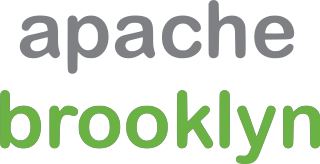 W
WApache Brooklyn is an open-source framework for modeling, deploying and managing distributed applications defined using declarative YAML blueprints. The design is influenced by Autonomic computing and promise theory and implements the OASIS CAMP and TOSCA standards.
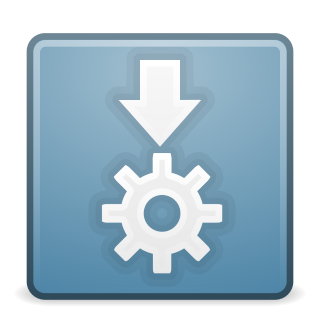 W
WAppImage is a format for distributing portable software on Linux without needing superuser permissions to install the application. It tries also to allow Linux distribution-agnostic binary software deployment for application developers, also called upstream packaging. Released first in 2004 under the name klik, it was continuously developed, then renamed in 2011 to PortableLinuxApps and later in 2013 to AppImage.
 W
WA computer appliance is a computer with software or firmware that is specifically designed to provide a specific computing resource. Such devices became known as appliances because of the similarity in role or management to a home appliance, which are generally closed and sealed, and are not serviceable by the user or owner. The hardware and software are delivered as an integrated product and may even be pre-configured before delivery to a customer, to provide a turn-key solution for a particular application. Unlike general purpose computers, appliances are generally not designed to allow the customers to change the software and the underlying operating system, or to flexibly reconfigure the hardware.
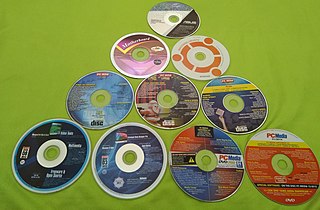 W
WCovermount is the name given to storage media or other products packaged as part of a magazine or newspaper. The name comes from the method of packaging; the media or product is placed in a transparent plastic sleeve and mounted on the cover of the magazine with adhesive tape or glue.
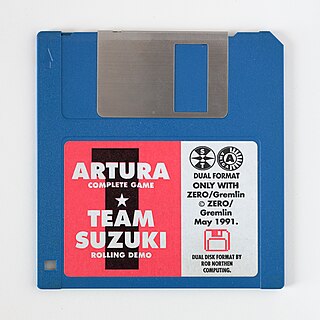 W
WDual format is a technique used to allow two completely different systems software to reside on the same disk.
 W
WThe Electronic AppWrapper (EAW) was an early commercial electronic software distribution catalog.
 W
WFlatpak is a utility for software deployment and package management for Linux. It is advertised as offering a sandbox environment in which users can run application software in isolation from the rest of the system.
 W
WLandscape is a systems management tool developed by Canonical. It can be run on-premises or in the cloud depending on the needs of the user. It is primarily designed for use with Ubuntu derivatives such as Desktop, Server, and Core. Landscape provides administrative tools, centralized package updates, machine grouping, script deployment, security audit compliance and custom software repositories for management of up to 40,000 instances.
 W
WLogging as a service (LaaS) is an IT architectural model for centrally ingesting and collecting any type of log files coming from any given source or location; such as servers, applications, devices etc. The files are "normalized" or filtered for reformatting and forwarding to other dependent systems to be processed as “native” data, which can then be managed, displayed and ultimately disposed of according to a predesignated retention schedule based on any number of criteria.
 W
WLola.com is a software as a service (SaaS) company based in Boston, Massachusetts. It is best known for developing corporate travel management and expense software for web browsers, the App Store and Google Play. The company was founded in 2015 by former Kayak.com executives, Paul M. English and Bill O'Donnell.
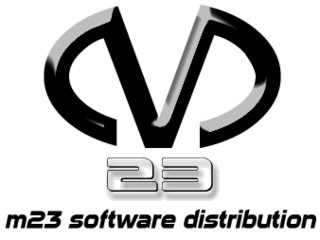 W
Wm23 is a software distribution and management system for the Debian, Ubuntu, Kubuntu Linux, Xubuntu, Linux Mint, elementary OS, Fedora, CentOS and openSUSE distributions.
 W
WMicrosoft Intune, which is a part of Microsoft Endpoint Manager, is a Microsoft cloud-based management tool for mobile devices that aims to provide unified endpoint management of both corporate and BYOD equipment in a way that protects corporate data. It extends some of the "on-premises" functionality of Microsoft System Center Configuration Manager to the Windows Azure cloud.
 W
WOn-premises software is installed and runs on computers on the premises of the person or organization using the software, rather than at a remote facility such as a server farm or cloud. On-premises software is sometimes referred to as "shrinkwrap" software, and off-premises software is commonly called "software as a service" ("SaaS") or "cloud computing".
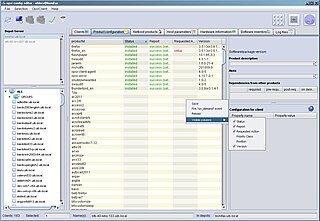 W
WOpsi is a software distribution and management system for Microsoft Windows clients, based on Linux servers. Opsi is developed and maintained by uib GmbH from Mainz, Germany. The main parts of Opsi are open-source licensed under the GNU Affero General Public License.
 W
WUbuntu is a Linux distribution based on Debian and composed mostly of free and open-source software. Ubuntu is officially released in three editions: Desktop, Server, and Core for Internet of things devices and robots. All the editions can run on the computer alone, or in a virtual machine. Ubuntu is a popular operating system for cloud computing, with support for OpenStack. Ubuntu's default desktop has been GNOME, since version 17.10.
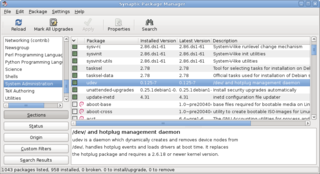 W
WA package manager or package-management system is a collection of software tools that automates the process of installing, upgrading, configuring, and removing computer programs for a computer in a consistent manner.
 W
WRudder is an open source audit and configuration management utility to help automate system configuration across large IT infrastructures. Rudder relies on a lightweight local agent installed on each managed machine.
 W
WSelf-service is the practice of serving oneself, usually when making purchases. Aside from Automatic Teller Machines, which are not limited to banks, and customer-operated supermarket check-out, labor-saving of which has been described as self-sourcing, there is the latter's subset, selfsourcing and a related pair: End-user development and End-user computing.
 W
WSnap is a software packaging and deployment system developed by Canonical for operating systems that use the Linux kernel. The packages, called snaps, and the tool for using them, snapd, work across a range of Linux distributions and allow upstream software developers to distribute their applications directly to users. Snaps are self-contained applications running in a sandbox with mediated access to the host system. Snap was originally released for cloud applications but was later ported to work for Internet of Things devices and desktop applications too.
 W
WSoftware remastering is software development that recreates system software and applications while incorporating customizations, with the intent that it is copied and run elsewhere for "off-label" usage. The term comes from remastering in media production, where it is similarly distinguished from mere copying.
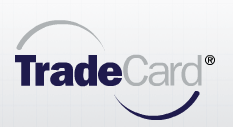 W
WTradeCard, Inc. was an American software company. Its main product, also called TradeCard, was a SaaS collaboration product that was designed to allow companies to manage their extended supply chains including tracking movement of goods and payments. TradeCard software helped to improve visibility, cash flow and margins for over 10,000 retailers and brands, factories and suppliers, and service providers operating in 78 countries.
 W
WVelocify, Inc. is a cloud computing company headquartered in El Segundo, California that provides cloud-based intelligent sales automation software designed for fast-paced sales environments.
 W
WIn computing, XCOPY is a command used on IBM PC DOS, MS-DOS, IBM OS/2, Microsoft Windows, FreeDOS, ReactOS, and related operating systems for copying multiple files or entire directory trees from one directory to another and for copying files across a network.
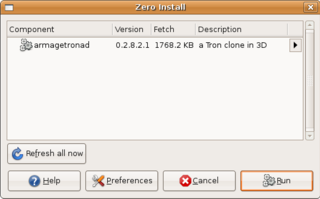 W
WZero Install is a means of distributing and packaging software for multiple operating systems.